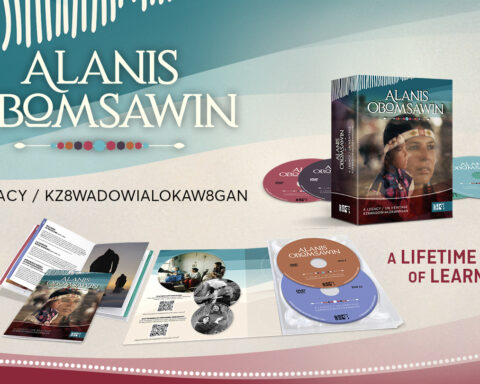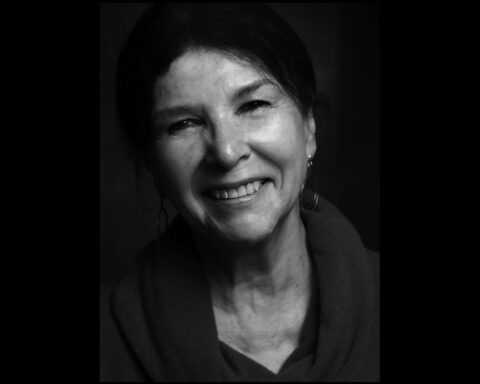On the occasion of their 10th anniversary, the Cinema Politica team chooses their Top 10 moments from their first decade (with one honourable mention.)
1. The Corporation (fall 2003)
Filmmaker Mark Achbar brought the three-hour version of the film to a packed house. “This was one of the few instances we have had to turn away audiences as we were full to our 700-seat capacity,” recalls Winton. In a bit of political theatre to accent the screening, all the CP organizers and volunteers dressed up in suits to look the corporate part; Achbar handed out feedback sheets to the audience to help with the next edit of the film and he says it was one of the most engaged and thoughtful audiences he has ever encountered.
2. The Yes Men Fix the World (winter 2010)
An epic snowstorm had CP organizers biting their fingernails. “We had pumped up the screening in the local media and had invited intrepid Yes Men impostors Mike Bonanno and Andy Bichlbaum to present the film,” recalls Turnin. “Mike was driving from upstate New York as reports of shut-down highways and knee-high snowfall on Montreal streets poured in, so we prepared for a disaster—which, thankfully, never came. Both Yes Men made it in the nick of time, our cinema filled to capacity and we had one of our best screenings. Despite the weather, we had to turn about 300 people away.”
3. SEX, LABOUR, SMUT (fall 2009)
In 2009, CP organized a mini-festival dedicated to sex work, sex and sexuality, screening 20 films including vintage silent stag films, taking the plunge into their first foray into the dirty world of sex and economics. “We were worried some of our regular audience members might flee the theatre at the sight of some pretty racy stuff,” says Turnin. “But we were delighted to see the only person who left actually had to go to the washroom.” Highlights from that weekend include the live performance accompaniment to the stag film screenings by Josh “SoCalled” Dolgin and a fabulous discussion with performance artist Mirha-Soleil Ross.
4. Kiviak vs. Canada and In Defense of Our Treaties (winter 2009)
The lights slowly came up after the credits rolled and as the audience sat in anticipation, a gigantic friendly face suddenly appeared on the blank screen, peering out at the crowd like they were mice in a maze. It was Zach Kunuk, the director of Kiviak. Having spent the whole day connecting his satellite in Canada’s North, where Wi-Fi isn’t exactly ubiquitous, he finally connected by video and proclaimed, “Wow, this is like Star Trek.” It set the tone for what turned out to be a great Q&A with Kunuk.
5. Waiting for Martin (2004)
This playful doc by close friend and CP supporter Magnus Isacsson, who passed away last year, was screened to a packed room of people all singing along to political songs sung by David Bernans, star of the film, who showed up to the screening with his guitar to get the crowd riled for the projection.
6. Status Quo: The Unfinished Business of Feminism in Canada (winter 2013)
CP screenings of this re-education doc were packed in Montreal and Toronto and the director Karen Cho made sure that several feminist activist protagonists from the doc and the communities they work with would be in attendance to partake in the post-screening discussion. “We were thrilled to be in the presence of fabulous women activists from Families of Sisters in Spirit, The Philippine Women’s Centre Ontario and Quebec, Abortion Rights Coalition, Childcare Resource and Research Unit in Toronto and Rebelles,” says Turnin.
7. John Greyson getting the inaugural Alanis Obomsawin Award (fall 2010)
In September of 2010 CP gave its first Alanis Obomsawin Award for Commitment to Community and Resistance, what Winton calls “the longest-named award in Canada.” Winton says the selection of the first recipient was obvious: “Our first choice was queer activist, teacher and media-maker ninja John Greyson, who accepted the award from Obomsawin herself. Afterward Greyson regaled our audiences with talk of pride, penguins, musical ear worms, South African apartheid, Palestinian solidarity and segregation.” Adds Turnin, “We expected nothing less.”
8. Be Smile: The Stories of Two Urban Inuit (2007)
For the world premiere of this intimate doc, CP had the director and the two main subjects of the film present for what Turnin describes as “one of our best Q&As ever. The film follows a few urban Inuit who live in Montreal. Some are homeless, some are not, but overall their living conditions are dire. The Q&A was very moving because they were so generous with the honesty of their stories.”
9. Inside Lara Roxx (winter 2013)
“One of our favourite post-screening discussions because of the passion of our audiences, the humour of our guest speakers and the commitment to dialogue. This screening rocked beyond anything,” says Turnin. “Director Mia Donovan and protagonist Lara Roxx led the Q&A, with Roxx infusing the discussion with one hilarious one-liner zinger after another. In 10 years of organizing screenings, we’ve never seen so many leave our screening with such huge smiles. And yes!—that’s after watching a doc on a serious issue.” Donovan’s hugely personal feature doc tells the story of Roxx, a porn starlet who contracts HIV while working in the business and her subsequent struggle with the resulting health and emotional issues.
10. 5 Broken Cameras (winter 2012)
“We have never, ever seen over 700 audience members simultaneously leap to their feet as a film ends,” says Winton. “We’ve seen a lot of standing ovations at CP screenings, all of them deserved, but those are the kinds that go section by section until everyone is standing. At our screening of 5 Broken Cameras not one audience member needed time to consider—the whole room went up at once as the credits rolled and co-director Emad Burnat took to the stage. The love and support was palpable and reinforced the sentiment in us: this is why we do what we do. The film would go on to win our Audience Choice Award for 2012.”
Honourable Mention: Punishment Park (fall 2013)
“This is the most controversial screening we’ve ever had,” says Winton. And that isn’t so surprising, when one considers that Punishment Park is a mockumentary created by Peter Watkins, the director behind the legendary mockumentary about nuclear war, The War Game (1965), a film that would be censored by the BBC and then go on to win an Oscar. Punishment Park (1971) depicts a group of hippies and other countercultural types being picked up by American military cops and then detained and tortured. “We decided not to tell the audience in advance that they would be watching a fake doc,” says Winton. “I figured they’d figure it out. But they didn’t. After the screening, people were shell-shocked and some were in tears. Some said that we should have warned them about showing a film that depicted executions. We had to run after people as they were leaving to tell them it wasn’t real. We weren’t prepared for the fact that our audiences are so used to us showing documentary.”











